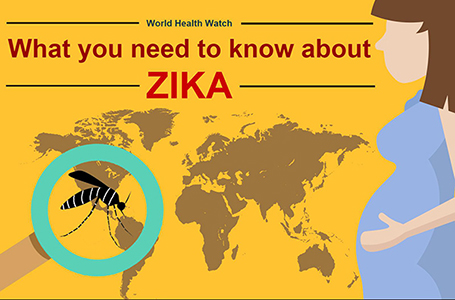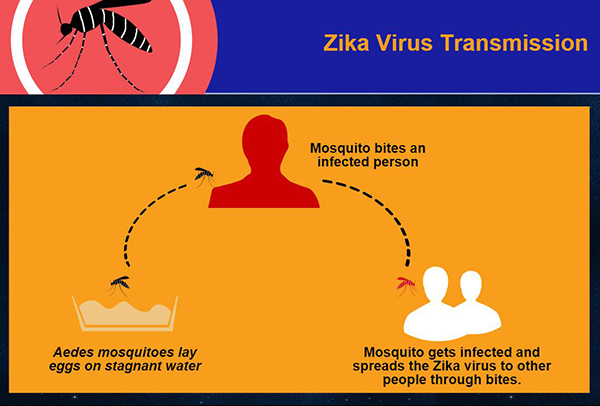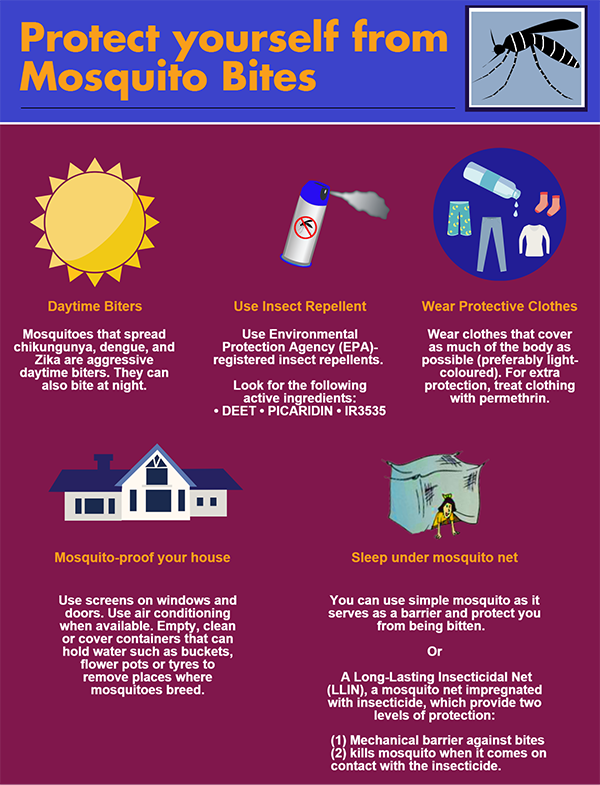The Zika virus is a mosquito-transmitted infection related to dengue, yellow fever and West Nile virus. First discovered in the Zika forest in Uganda in 1947, Zika virus is common in Africa and Asia. However, it did not begin spreading widely in the Western Hemisphere until last May 2015, when an outbreak occurred in Brazil.
Zika doesn’t cause much harm to adults. Most infected individuals are symptomless, and those who experience a bout of fever or red rash often recover within a few days. What has raised alarm is its link to the serious neurological birth defects known as microcephaly, in which babies are born with small heads and under developed brains. Just recently, the World Health Organization declared an international public health emergency due to the virus.
Zika and Pregnancy
Zika virus infection in pregnant women has been linked to some babies being born with microcephaly. Although, the link between Zika virus and poor pregnancy outcomes has not been confirmed by studies, pregnant women or those trying to become pregnant are urged to consider postponing travel to Zika-affected areas.
Transmission
Like a number of other diseases such as dengue and chikungunya, which are also spread by mosquitoes, the Zika virus is spread through the bite of the Aedes species of mosquito. Mosquitoes become infected when they bite a human who has the virus, and are then capable of spreading the disease to other susceptible humans. Between 20 and 25 percent of those persons who become infected will develop symptoms. (CDC, 2016)
- Mosquitoes that spread chikungunya, dengue, and Zika are aggressive daytime biters. They can also bite at night.
- Mosquitoes become infected when they feed on a person already infected with the virus. Infected mosquitoes can then spread the virus to other people through bites.
- A mother already infected with Zika virus near the time of delivery can pass on the virus to her newborn around the time of birth, but this is rare.
- Spread of the virus through blood transfusion and sexual contact have been reported.
Diagnosis
- The symptoms of Zika are similar to those of dengue and chikungunya, diseases spread through the same mosquitoes that transmit Zika.
- Specialized blood tests may be ordered to look for Zika or other similar viruses like dengue or chikungunya.
Symptoms
Symptoms typically last between two and seven days. Complications are rare, but some cases require hospitalization for supportive care. As far as we know, deaths have not been reported as a result of Zika virus infection. (CDC, 2016)
- The most common symptoms of Zika are fever, rash, joint pain, or conjunctivitis (red eyes). Other common symptoms include muscle pain and headache. The incubation period (the time from exposure to symptoms) for Zika virus disease is not known, but is likely to be a few days to a week.
- The illness is usually mild with symptoms lasting for several days to a week.
- People usually don’t get sick enough to go to the hospital, and they very rarely die of Zika.
Treatment
There is no vaccine or drug yet to treat the virus. However, the following steps will help you get through the disease:
- Get plenty of rest.
- Drink fluids to prevent dehydration.
- Take medicine such as acetaminophen (Tylenol®) to relieve fever and pain.
- Do not take aspirin and other non-steroidal anti-inflammatory drugs.
- If you are taking medicine for another medical condition, talk to your healthcare provider before taking additional medication.
If you have Zika, prevent mosquito bites for the first week of your illness.
- During the first week of infection, Zika virus can be found in the blood and passed from an infected person to a mosquito through mosquito bites.
- An infected mosquito can then spread the virus to other people.
Prevention
There is no vaccine for the virus yet, so all preventive measures should be focused on preventing mosquito bites.
Aedis mosquitoes typically lay eggs in and near standing water in things like buckets, bowls, animal dishes, flower pots and vases. Their breeding sites pose a significant risk factor for Zika virus infection. Prevention and control relies on reducing mosquitoes through source reduction and reducing contact between mosquitoes and people. (CDC, 2016)
The following steps can help protect you from - and prevent the spread of – Zika
- Empty, clean or cover containers that can hold water such as buckets, flower pots or tyres to remove places where mosquitoes breed.
- Wear clothes that cover as much of the body as possible (preferably light-coloured).
- Stay in places with air conditioning or those with window and door screens.
- Use Environmental Protection Agency (EPA)-registered insect repellents. When used as directed, EPA-registered insect repellents are proven safe and effective, even for pregnant and breast-feeding women.
- Treat clothing and gear with permethrin or purchase permethrin-treated items.
Vaccine Development
The search is on to develop a vaccine, disease experts say it could be years – maybe even a decade – before an effective product becomes available to public. Aside from the fact that there are still several things to learn about the virus, the vaccine must go through rigorous testing to ensure its safety and effectiveness.
There is now a rush to develop a vaccine. Global firms including France’s Sanofi, London’s GlaxoSmithKline and Japan’s Takeda have begun their own research. But, an Indian company, Bharat Biotech, claims that they might have developed a vaccine for the Zika virus. Bharat Biotech was the first company to file a patent for a Zika vaccine, which is now in pre-clinical testing as the firm prepares to test it on animals.
Two ways to prevent Zika according to Bharat Biotech
Vaccines work by stimulating a patient’s immune system with a weaker version of the disease, preparing the body to defend attacks by the real contagion. Bharat Biotech’s has two vaccine candidates.
The first uses strands of DNA that belong to the Zika virus. While these so-called recombinant DNA vaccines are easier to create, they don’t always produce a strong enough immune response.
The second is an inactivated version of the Zika virus, which means the virus is unable to replicate and cause infection, but it is still able to trigger an immune response. Experts believe that this type of vaccine stands a better chance of success.
It is not clear if and when Bharat’s vaccines will reach the market. Animal testing is expected to take about five months, and then they would need to be tested on humans. (Karnik, 2016)
Help from the Indian regulatory government and the World Health Organization is needed to expedite the process.
References:
Madhura Karnik., An Indian biotech company has been developing Zika vaccines for over a year. Quartz India. Available from: http://qz.com/609291/this-indian-biotech-firm-is-the-worlds-first-to-ready-a-zika-vaccine-for-testing/. [Accessed February 11, 2016].
Donald G. McNeil Jr., Catherine Saint Louis and Nicholas St. Fleur., Short Answers to Hard Questions About Zika Virus. The New York Times Available from: http://www.nytimes.com/interactive/2016/health/what-is-zika-virus.html#id-569abb4663701c0001000001. [Accessed February 11, 2016].
World Health Organization. Zika Virus. Available from: http://www.who.int/mediacentre/factsheets/zika/en/. [Accessed February 11, 2016].
Centers for Disease Control and Prevention, Zika Virus Symptoms. Available from: http://www.cdc.gov/zika/symptoms/index.html. [Accessed February 11, 2016].
Centers for Disease Control and Prevention, Zika Virus Prevention. Available from: http://www.cdc.gov/zika/prevention/index.html [Accessed February 11, 2016].
Centers for Disease Control and Prevention, Zika Virus Transmission. Available from: http://www.cdc.gov/zika/transmission/index.html. [Accessed February 11, 2016].











 UK
UK







 Australia
Australia China
China Europe
Europe France
France Germany
Germany Indonesia
Indonesia Korea
Korea Malaysia
Malaysia Myanmar
Myanmar North America
North America Pakistan
Pakistan Philippines
Philippines Russia
Russia Singapore
Singapore South Africa
South Africa Spain
Spain Thailand
Thailand Vietnam
Vietnam